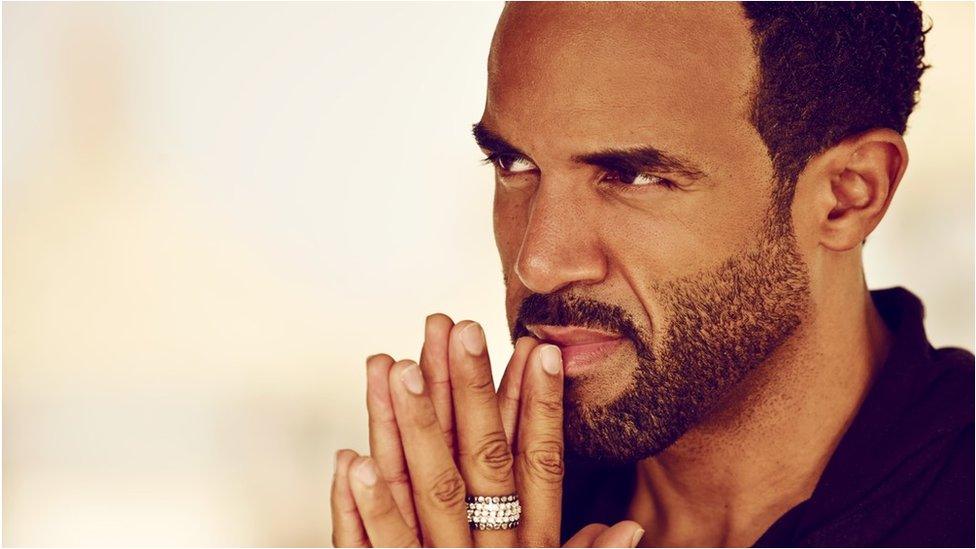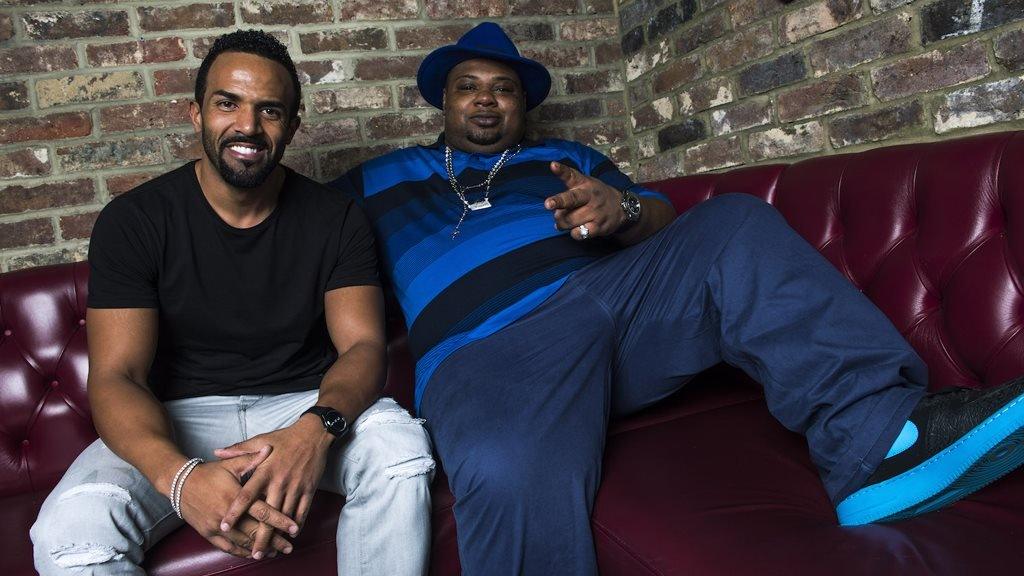Born to redo it: Craig David on his 'crazy' career revival
- Published

Craig David is back in the charts after almost a decade in the wilderness. He looks back at his success, and reveals why Re-Rewind was almost lost to history.
Barring a Samantha Mumba revival, it's the most surprising comeback of the year.
Craig David is in the top 20 for the first time in a decade with a new single, When The Bassline Drops, external.
"Do you know what? It's overwhelming," says the singer. "The love that I've seen from people has been crazy."
A collaboration with MC Big Narstie, the track updates David's notorious noughties hit Re-Rewind (The Crowd Say Bo Selecta!) for the grime generation.
The track has climbed up the charts steadily since it was first released in December - but it came about almost by accident.
Appearing on BBC 1 Xtra last November, David sang his hit single Fill Me In over the backing to Justin Bieber's Where Are U Now, external. As the cover went viral, Big Narstie, who happened to be in the studio, insisted they create a track together.
"It's quite a pivotal moment for both of us," says David, "because grime has been on the up with artists like Skepta and Stormzy starting to get mainstream love, and I was very much a pioneer in the garage scene. So bringing the two together it's like this," he says, gesturing to suggest a moderate explosion.
The song has been so successful that the 34-year-old has signed a joint record deal with Sony Music and indie label Speakerbox - which called him "one of the UK's most formidable male artists" who has "never been more relevant than he is right now".
But it wasn't always this way.
Figure of fun
Craig David suffered one of the biggest falls from grace in modern music. His debut album, Born To Do It, sold an astonishing seven million copies worldwide, marking him out as one of the UK's most promising young musicians.
By 2010, he was releasing an album of lukewarm Motown covers. It shifted a mere 33,779 units, after which the singer disappeared to Miami and obscurity.
Many people lay the blame with comedian Leigh Francis, whose rubber-faced caricature of the star shouting "Bo Selecta" down the camera lens made him a figure of ridicule.
"I thought it was going to go away, eventually, and that we had to ignore it," David told Music Week back in 2013, external. "But it did completely the opposite, it just grew and grew. I was watching a brand, our brand, being destroyed."

Fill Me In earned the star won a Mobo for best single in 2000, but he walked away from the Brits with no awards, despite six nominations
In truth, though, David had struggled to recreate the effortless melodies of his first album. The follow-up, 2002's Slicker Than Your Average, ventured into US R&B, while later albums saw him dabble with dance and club sounds.
"As soon as you start to veer into the lane of 'this is the hot thing, I'll get on this' people are like, 'well, that's not really you, is it?'," he admits today.
"There were moments in my career where we were making albums and, not putting on fillers exactly, but it wasn't all the hotness that you knew you had."
'We almost lost Re-wind'
Craig Ashley David was born and raised in Southampton. Growing up on the Holyrood council estate, he was surrounded by music - his mother introducing him to Terence Trent D'Arby, Mariah Carey and The Osmonds, while his father played bass in a local reggae band, The Ebony Rockers.
Aged 11, he was encouraged to take guitar lessons and slowly turned his bedroom into a recording studio, amassing an array of speakers and microphones around his fold-up bed.
His first break came when he won a songwriting contest held by the R&B group Damage, who released his track, I'm Ready, as a b-side to their 1997 single Wonderful Tonight.
But it was a collaboration with dance producers Artful Dodger that was to make his name.
They first met when David wrote a "kick racism out of football" song for Southampton FC, and continued to bump into each other as they DJ'd around local clubs.
"We had this connection," the star recalls. "I was writing songs but I hadn't got any music; they were writing music but they had no top line melodies. You couldn't have asked for anything better."

The star's TS5 club night has grown from his apartment in Miami to a global phenomenon
The first song they released was Re-Rewind, external - a rhythmically tricky garage track that eventually reached number two in the UK.
Recalling the recording session, David says the song was nearly lost to history.
"We finished the song and dubbed it onto a little TDK D90 cassette to go and play it in the car," he says. "It sounded good but there was a couple of little tweaks we wanted to do - and literally as [producer Mark Hill] turned the computer on, all we saw was this 'error, file number' message.
"The only way to get rid of it was to press OK. So we pressed OK, and it kept coming up with new error numbers. So we'd press OK, press OK, press OK. But when we looked at the session, all that we saw was the hi-hats.
"I was like, 'are you actually for real?'
"So that plastic TDK tape became gold dust. We had the whole song on there, and we had to use the recording as our reference, playing it very carefully so it didn't get chewed up, and trying to remember all the things we did. And that was Rewind."
The success of the song won David a solo deal, and he continued to collaborate with Hill on the hit songs Fill Me In and 7 Days. Although they retained some of the sonic signatures of garage, he was already distancing himself from the genre.
"It got to the point where every artist, and every new pop group that were put together, were doing garage and it started to become a fad thing."
Craig David performs Fill Me In on Later... with Jools Holland in 2000.
As success grew, so did the star's ego.
He's reluctant to cite specifics but acknowledges: "You can get sucked in very quickly. It all starts going 100 miles an hour and you start to believe you're all that."
"You get the sports car, you're living in Miami, you've got the house you always wanted. You think you've got it all. But it just keeps going. The £10 in your pocket is the same as a hundred grand. It's not enough. Now you want a million. Oh, a million's not enough, and I want another house."
In the end, David's wilderness years gave him some perspective. He moved to Miami, set up a small club night in his apartment, and abandoned the all-consuming ambition that drove him in the 2000s.
"If someone had said to me 'the best move for you now would be to go away and put the faders down for six years' I wouldn't have understood," he says. "But little did I know..."
Now, that club night has grown from his living room to a residency in Ibiza, he's in demand as a singer, and talks in a well-meaning but semi-coherent psychobabble.
"I recognise life is like a magnet," he philosophises. "Positive and negative are on the opposite sides of the magnet. You can try to cut the negative part off, but it's still there.
"When you accept both of them it's like, 'you know what? Don't get too identified with success or too identified with failure - just be cool with them'.
"Like, this When The Bassline thing is love-ly but don't get all gassed about it and turn into that guy again, who's like 'I'm the man'. Nah. People love the song. Just enjoy that."

Craig David and Big Narstie: 'It's a beautiful time for the grime scene'
